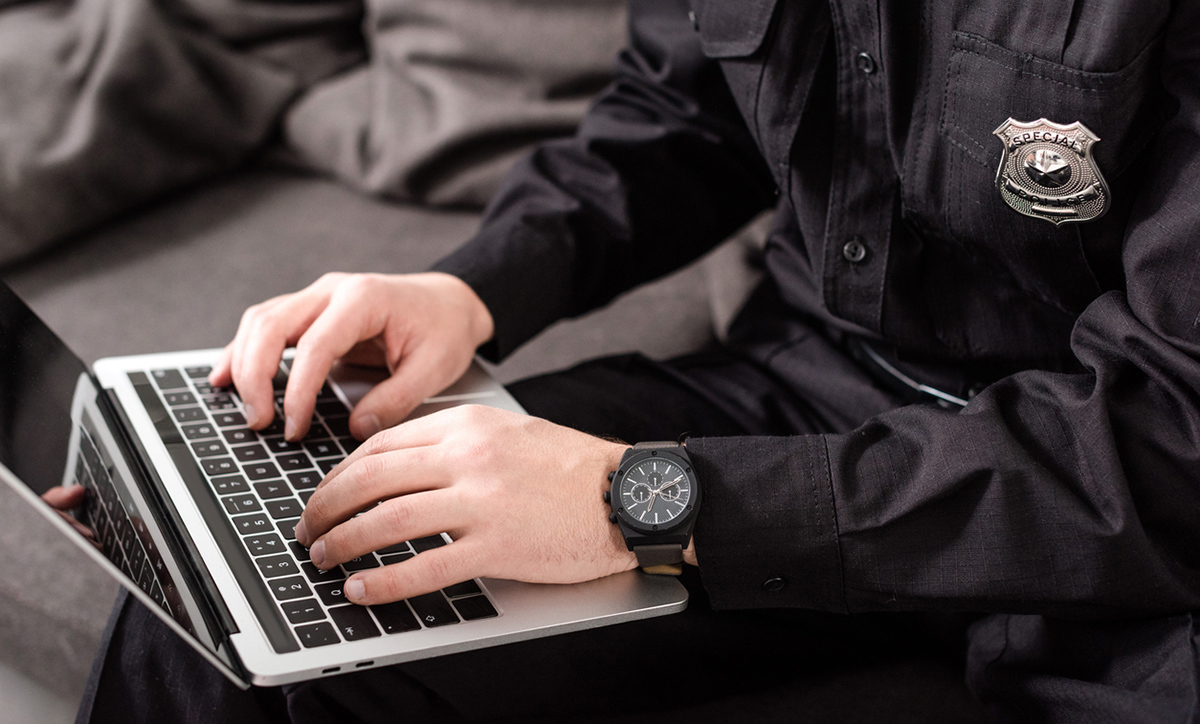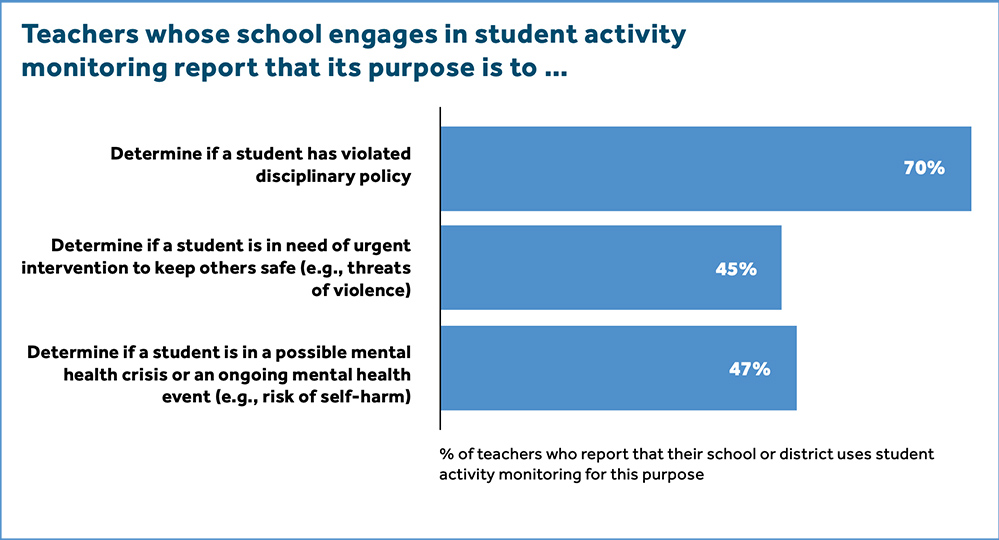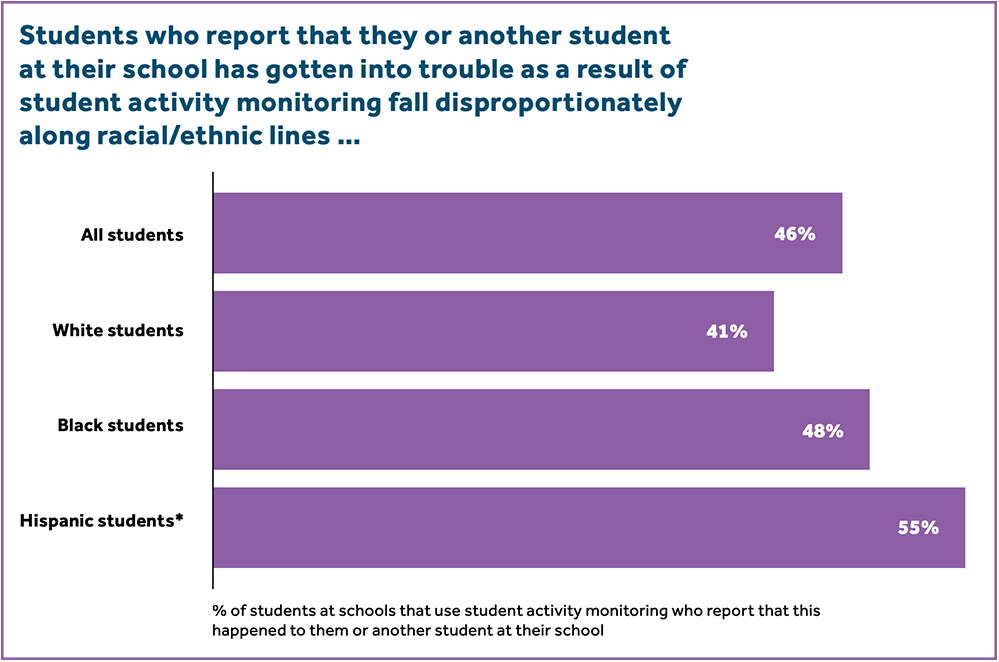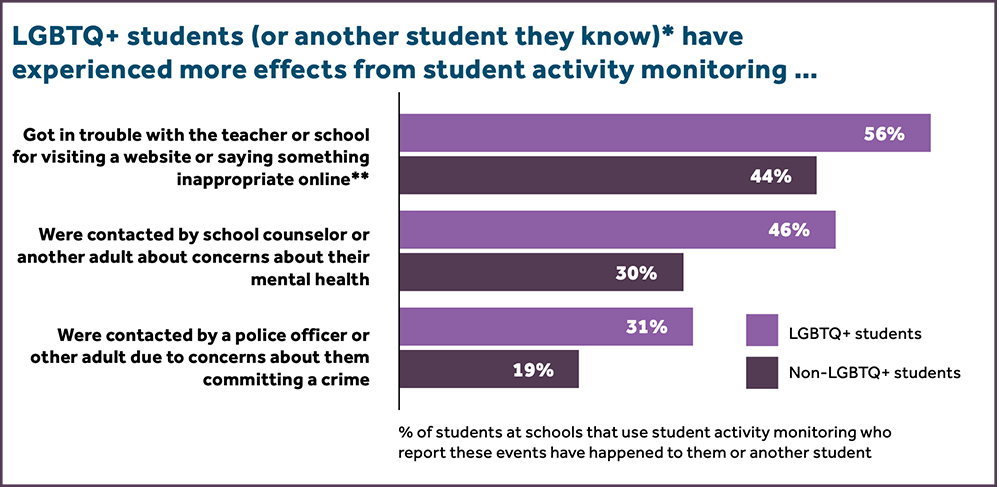Survey Reveals Extent that Cops Surveil Students Online — in School and at Home
Schools adopted digital monitoring tools to keep students safe. Instead, they’re being used to discipline them, report finds

Get stories like these delivered straight to your inbox. Sign up for The 74 Newsletter
When Baltimore students sign into their school-issued laptops, the police log on, too.
Since the pandemic began, Baltimore City Public Schools officials have tracked students’ online lives with GoGuardian, a digital surveillance tool that promises to identify youth at risk of harming themselves or others. When GoGuardian flags students, their online activities are shared automatically with school police, giving cops a conduit into kids’ private lives — including on nights and weekends.
Such partnerships between schools and police appear startlingly widespread across the country with significant implications for youth, according to the results of a national survey released Wednesday by the nonprofit Center for Democracy and Technology. Nearly all teachers — 89% — reported that digital student monitoring tools like GoGuardian are used in their schools. And nearly half — 44% — said students have been contacted by the police as a result of student monitoring.
The pandemic has led to major growth in the number of schools that rely on activity monitoring software to uncover student references to depression and violent impulses. The tools, offered by a handful of tech companies, can sift through students’ social media posts, follow their digital movements in real-time and scan files on school-issued laptops — from classroom assignments to journal entries — in search of warning signs.
Educators say the tools help them identify youth who are struggling and get them the mental health care they need at a time when youth depression and anxiety are spiraling. But the survey suggests an alternate reality: Instead of getting help, many students are being punished for breaking school rules. And in some cases, survey results suggest, students are being subjected to discrimination.
The report raises serious questions about whether digital surveillance tools are the best way to identify youth in need of mental health care and whether police officers should be on the front lines in responding to such emergencies.
“If we’re saying this is to keep students safe, but instead we’re using it punitively and we’re using it to invite law enforcement literally into kids’ homes, is this actually achieving its intended goal?” asked Elizabeth Laird, a survey author and the center’s director of equity in civic technology. “Or are we, in the name of keeping students safe, actually endangering them?”
Among teachers who use monitoring tools at their schools, 78% said the software has been used to flag students for discipline and 59% said kids wound up getting punished as a result. Yet just 45% of teachers said the software is used to identify violent threats and 47% said it is used to identify students at risk of harming themselves.

The findings are a direct contradiction of the stated goal of student activity monitoring, Laird said. School leaders and company executives have long maintained that the tools are not a disciplinary measure but are designed to identify at-risk students before someone gets hurt.
The Supreme Court’s recent repeal of Roe v. Wade, she said, further muddles police officers’ role in student activity monitoring. As states implement anti-abortion laws, civil rights groups have warned that data from student activity monitoring tools could help the police identify youth seeking reproductive health care.
“We know that law enforcement gets these alerts,” she said. “If you are in a state where they are looking to investigate these kinds of incidents, you’ve invited them into a student’s house to be able to do that.”
A tale of discrimination
In Baltimore, counselors, principals and school-based police officers receive all alerts generated by GoGuardian during school hours, according to an October 2021 investigative report by The Real News Network, a nonprofit media outlet. Outside of school hours, including on weekends and holidays, the responsibility to monitor alerts falls on the police, the outlet reported, and on numerous occasions officers have shown up at students’ homes to conduct wellness checks. On multiple occasions, students have been transported to the hospital for emergency mental health care.
In a statement to The 74, district spokesperson Andre Riley said that GoGuardian helps officials “identify potential risks to the safety of individual students, groups or schools,” and that “proper accountability measures are taken” if students violate the code of conduct or break laws.
“The use of GoGuardian is not simply a prompt for a law enforcement response,” Riley added.
Leading student surveillance companies, including GoGuardian, have maintained that their interactions with police are limited. In April, Democratic Sens. Elizabeth Warren and Ed Markey warned in a report that schools’ reliance on the tools could violate students’ civil rights and exacerbate “the school-to-prison pipeline by increasing law enforcement interactions with students.” Warren and Markey focused their report on four companies: GoGuardian, Gaggle, Securly and Bark.
In a letter to Warren and Markey, Gaggle executives said the company contacts law enforcement for wellness checks if they are unable to reach school-based emergency contacts and a child appears to be “in immediate danger.” In blog posts on the company’s website, school officials in Wichita Falls, Texas, Cincinnati, Ohio, and Miami, Florida, acknowledged contacting police in response to Gaggle alerts.
In some cases, school leaders ask Securly to contact the police directly and request they conduct welfare checks on students, the company wrote in its letter to lawmakers. Executives at Bark said “there are limited options” beyond police intervention if they identify a student in crisis but they cannot reach a school administrator.
“While we have witnessed many lives saved by police in these situations, unfortunately many officers have not received training in how to handle such crises,” the company acknowledged in its letter. “Irrespective of training there is always a risk that a visit from law enforcement can create other negative outcomes for a student and their family.”
In its privacy policy, GoGuardian states the company may disclose student information “if we believe in good faith that doing so is necessary or appropriate to comply with any law enforcement, legal or regulatory process.”

Meanwhile, survey results suggest that student surveillance tools have a negative disparate impact on Black and Hispanic students, LGBTQ youth and those from low-income households. In a letter on Wednesday to coincide with the survey’s release, a coalition of education and civil rights groups called on the U.S. Department of Education to issue guidance warning schools that their digital surveillance practices could violate federal civil rights laws. Signatories include the American Library Association, the Data Quality Campaign and the American Civil Liberties Union.
“This is becoming a conversation not just about privacy, but about discrimination,” Laird said. “Without a doubt, we see certain groups of students having outsized experiences in being directly targeted.”
In a youth survey, researchers found that student discipline as a result of activity monitoring fell disproportionately along racial lines, with 48% of Black students and 55% of Hispanic students reporting that they or someone they knew got into trouble for something that was flagged by an activity monitoring tool. Just 41% of white students reported having similar experiences.
Nearly a third of LGBTQ students said they or someone they know experienced nonconsensual disclosure of their sexual orientation or gender identity — often called outing — as a result of activity monitoring. LGBTQ youth were also more likely than straight and cisgender students to report getting into trouble at school and being contacted by the police about having committed a crime.
Some student surveillance companies, like Gaggle, monitor references to words including “gay” and “lesbian,” a reality company founder and CEO Jeff Patterson has said was created to protect LGBTQ youth, who face a greater risk of dying by suicide. But survey results suggest the heightened surveillance comes with significant harm to youth, and Laird said if monitoring tools are designed with certain students in mind, such as LGBTQ youth, that in itself is a form of discrimination.

In its letter to the Education Department’s Office for Civil Rights Wednesday, advocates said the disparities outlined in the survey run counter to federal laws prohibiting race-, sex- and disability-based discrimination.
“Student activity monitoring is subjecting protected classes of students to increased discipline and interactions with law enforcement, invading their privacy, and creating hostile environments for students to express their true thoughts and authentic identities,” the letter states.
The Education Department’s civil rights division, they said, should condemn surveillance practices that violate students’ civil rights and launch “enforcement action against violations that result in discrimination.”
Lawmakers consider youth privacy
The report comes at a moment of increasing alarm about student privacy online. In May, the Federal Trade Commission announced plans to crack down on tech companies that sell student data for targeted advertising and that “illegally surveil children when they go online to learn.”
It also comes at a time of intense concern over students’ emotional and physical well-being. While the pandemic has led to a greater focus on youth mental health, the May mass school shooting in Uvalde, Texas, has sparked renewed school safety efforts. In June, President Joe Biden signed a law with modest new gun-control provisions and an influx of federal funding for student mental health care and campus security. The funds could lead to more digital student surveillance.
The results of the online survey, which was conducted in May and June, were likely colored by the Uvalde tragedy, researchers acknowledged. A majority of parents and students have a favorable view of student activity monitoring during school hours to protect kids from harming themselves or others, researchers found. But just 48% of parents and 30% of students support around-the-clock surveillance.
“Schools are under a lot of pressure to find ways to keep students safe and, like in many aspects of our lives, they are considering the role of technology,” Laird said.
Last week, the Senate approved two bipartisan bills designed to improve children’s safety online, including new restrictions on youth-focused targeted advertising. The effort comes a year after a whistleblower disclosed research showing that the social media app Instagram had a harmful effect on youth mental well-being, especially teenage girls. One bill, the Kids Online Safety Act, would require tech companies to identify and mitigate any potential harms their products may pose to children, including exposure to content that promotes self-harm, eating disorders and substance abuse.
Yet the legislation has faced criticism from privacy advocates, who argue it would mandate digital monitoring similar to that offered by student surveillance companies. Among critics is the Electronic Frontier Foundation, a nonprofit focused on digital privacy and free speech.
“The answer to our lack of privacy isn’t more tracking,” the group argued in a report. The legislation “is a heavy-handed plan to force technology companies to spy on young people and stop them from accessing content that is ‘not in their best interest,’ as defined by the government, and interpreted by tech platforms.”
Attorney Amelia Vance, the founder and president of Public Interest Privacy Consulting, said she worries the provisions will have a negative impact on at-risk kids, including LGBTQ students. Students from marginalized groups, she said, “will now be more heavily surveilled by basically every site on the internet, and that information will be available to parents” who could discipline teens for researching LGBTQ content. She said the legislation could force tech companies to censor content to avoid potential liability, essentially making them arbiters of community standards.
“When you have conflicting values in the different jurisdictions that the companies operate in, oftentimes you end up with the most conservative interpretations, which right now is anti-LGBT,” she said.
Get stories like these delivered straight to your inbox. Sign up for The 74 Newsletter

;)

